HQ/Tagged
MQ/Untagged
Scans
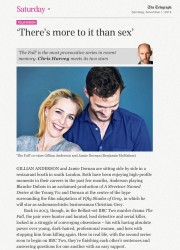
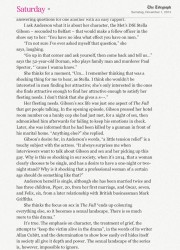
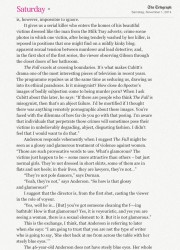
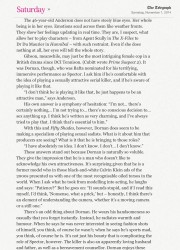
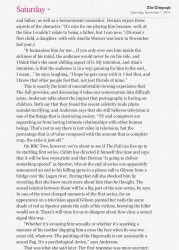
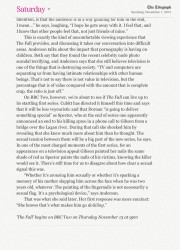
Transcripted by us
'The Fall' is the most provocative series in recent memory. Chris Harvey meets its two stars.
Gillian
Anderson and Jamie Dornan are sitting side by side in a restaurant
booth in South London. Both have been enjoying high-profile moments in
their careers in the past few months, Anderson playing Blanche Dubois in
an acclaimed production of A Streetcar Named Desire at the Young Vic
and Dornan at the centre of the hype surrounding the film adaptation of
Fifty Shades of Grey, in which he will star as sadomasochistic
businessman Christian Grey.
Back in 2013, though, in
the Belfast-set BBC Two murder drama The Fall, the pair were hunter and
hunted, lead detective and serial killer, locked in a struggle of
converging obsessions - his with having absolute power over young,
dark-haired, professional women, and with stopping him from killing
again. Here in real life, with the second series soon to begin on BBC
Two, they're finishing each other's sentences and answering questions
for one another with an easy rapport.
I ask Anderson
what it is about character, the Met's DSI Stella Gibson - seconded to
Belfast - that would make a fellow officer in the show say to her: "You
have no idea what effect you have on men."
"I'm not sure I've ever asked myself that question." she says, laughing.
"Go
up in that corner and ask yourself, then come back and tell us..." says
the 32-year-old Dornan, who plays family man and murderer Paul Spector.
"'cause I wanna know."
She thinks for a moment. "Um...
I remember thinking that was a shocking thing for me hear, as Stella. I
think she wouldn't be interested in men finding her attractive; she's
only interested in the ones she finds attractive enough to find her
attractive enough to satisfy her fleeting needs. I don't think that she
gives a shit."
Her fleeting needs. Gibson's sex life
was just one aspect of The Fall that got people talking. In the opening
episode, Gibson pressed her hotel room number on a hunky cop she had
just met, for a night of sex, then admonished him afterwards for failing
to keep his emotions in check. Later, she was informed that he had been
killed by a gunman in front of his marital home. "Anything else?" she
replied.
Gibson's desire for, in Anderson's words, "a
little tension relief" is a touchy subject with the actress. "It always
surprises me when interviewers want to talk about Gibson and sex and her
picking up this guy. Why is this so shocking in our society, when it's
2014, that a woman clearly chooses to be single, and has a desire to
have a one-night or two-night stand? Why is it shocking that
professional woman of a certain age should do something like that?"
Anderson
herself is single, although she has been married twice and has three
children, Piper, 20, from her first marriage, and Oscar, seven, and
Felix, six, from a later relationship with British businessman Mark
Griffiths.
She thinks the focus on the sex in The Fall
"ends up colouring everything else, so it becomes a sexual landscape.
There is so much more to this drama."
It's true. The
emphasis on character, the treatment of grief, the attempt to "keep the
victim alive in the drama", in the words of its writer Allan Cubitt, and
the determination to show how easily evil hides itself in society all
give it depth and power. The sexual landscape of the series is, however,
impossible to ignore.
It gives us a serial killer who
enters the homes of his beautiful victims, dressed like the man from the
Milk Tray adverts; crime scene photos in which one victim, after being
tenderly washed by her killer, is reposed in positions that one might
find on a mildly kinky blog; apparent sexual tension between murderer
and lead detective; and, in the first shot of the first series, the
viewer observing Gibson through the closet doors of her bathroom.
The
Fall excels at crossing boundaries. It's what makes Cubitt's drama one
of the most interesting pieces of television in recent years. The
programme repulses us at the same time as seducing us, drawing us into
its ethical paradoxes. It is misogynist? How close do Spector's images
of bodily subjection come to being murder porn? When I ask Cubitt about
this later, he says: "If there are people who think The Fall is
misogynist, then that's an abject failure. I'd be mortified if I thought
there was anything remotely pornographic about those images. You're
faced with the dilemma of how war do you go with that posing. I'm aware
that individuals that perpetrate those crimes will sometimes pose their
victims in unbelievably degrading, abject, disgusting, fashion. I didn't
feel that I would want would want to do that."
Anderson
responds vehemently when I suggest The Fall might be seen as a glossy
and glamorous treatment of violence against women. "Those are such
provocative words to use. What's glamorous? The victims just happen to
be - some more attractive than others - but just normal girls. They're
not dressed in short skirts, some of them are in flats and not heels; in
their lives, they are lawyers, they're not..."
"They're not pole dancers," says Dornan.
"Yeah, they're not," says Anderson. "So how glossy and glamorous?"
I suggest that the directors is, from the first shot, casting the viewer in the role of voyeur.
"Yes,
well he is... [But] you've got someone cleaning the fucking bathtub!
How is that glamorous? Yes, it is voyeuristic, and yes, you are seeing a
woman, there is a sexual element to it. But it is not glamorous."
This
is exchange, I think, that Anderson is referring to later wen she says:
"I am going to trust that you are not the type of writer who going to
say, 'She shot back at me from across the table with her steely blue
eyes.' "
The 46-year-old Anderson does not have steely
blue eyes. Her whole being is in her eyes. Emotions scud across them
like weather fronts. They show her feelings updating in real time. They
are, I suspect, what allow her to play characters - from Agent Scully in
The X-Files to Dr Du Maurier in Hannibal - with such restraint. Even if
she does nothing at all, her eyes will tell the whole story.
Gibson,
meanwhile, may just be the most intriguing female cop in a British
drama since DCI Tennison (Cubitt wrote Prime Suspect 2). It was Dornan,
though, who was Bafta nominated for his terrifying, immersive
performance as Spector. I ask him if he's comfortable with the idea of
playing a sexually attractive serial killer, and if he's aware of
playing it like that.
"I don't think he is playing it like that, he just happens to be an attractive man," says Anderson.
His
own answer is a symphony of hesitation: "I'm not... there's certainly
nothing... I'm not trying to... there's no conscious decision to... sex
anything up. I think he's written as very charming, and I've always
tried to play that. I think that's essential to him."
With
this and Fifty Shades, however, Dornan does seem to be making a
specialism of playing sexual sadists. What is it about him that
producers are seeing? What is it that he is bringing to those roles?
"I have absolutely no idea. I don't know. I don't... I don't know."
These
answers stand out because Dornan is naturally so voluble. They give the
impression that he is a man who doesn't like to acknowledge his own
attractiveness. It's surprising given that he is a former model who in
those black-and-white Calvin Klein ads of the 2000s presented us with
one of the most recognisable oiled torsos in the world. When I ask what
he took from modelling into acting, he laughs and says: "Patience?" But
he goes on: "It sounds stupid, and if I read this myself, I'd think,
'Nonsense, what a prick,' but - honestly, I think there's an element of
understanding the camera, whether it's a moving camera or a still one."
There's
an odd thing about Dornan. He wears his handsomeness so casually that
you forget instantly. Instead, he radiates warmth and humour. When he
says he was never interested in seeing fashion shots of himself, you
think, of course he wasn't; when he says he's sports mad, you think, of
course he is. It's not just his beauty that is complicating the role of
Spector, however. The killer is also an apparently loving husband and
father, as well as a bereavement counsellor. Dornan enjoys these aspects
of the character. "It's nice for me playing him because, well, at the
time I couldn't relate to being a father, but I can now." (Dornan's first
child, a daughter, with wife Amelia Warner was born in November last
year.)
"It humanises him for me... If you only ever
saw him inside the sickness of his mind, the audience would never be on
his side, and I think that's the most chilling aspect of it. My
intention, and Allan's intention, is that the audience is in a way
gunning for him in the end, I mean..." he says, laughing, "I hope he
gets away with it. I feel that, and I know that other people feel that,
not just friends of mine."
This is exactly the kind of
uncomfortable viewing experience that The Fall provides, and discussing
it takes our conversation into difficult areas. Anderson talks about the
impact that pornography is having on children. Both say that they found
the recent celebrity nude photo scandal terrifying, and Anderson says
that she still believes television is one of the things that is
destroying society. "TV and computers are separating us from having
intimate relationships with other human beings. That's not to say there
is not value in television, but the percentage that is of value compared
with the amount is complete crap, the ratio is just off."
On
BBC Two, however, we're about to see if The Fall can live up to its
startling first series. Cubitt has directed it himself this time and
says that it will be less voyeuristic and that Dornan "is going to
deliver someting special" as Spector, who at the end of series one
apparently announced an end to his killing spree in a phone call to
Gibson from a bridge over the Lagan river. During that call she shocked
him by revealing that she knew much more about him than he thought. The
sexual tension between them will be a big part of the first series, for
an appearance on a television appeal Gibson painted her nails the same
shade of red as Spector paints the nails of his victims, knowing the
killer would see it. There's still time for us to disagree about how
clear a sexual signal this was.
"Whether it's arousing
him sexually or whether it's sparking a memory of his mother slapping
him across the face when he was two years old, whatever. The painting of
the fingernails is not necessarily a sexual flag. It's a psychological
device," says Anderson.
That was what she said later. Her first response was more succinct: "She knows that's what makes him go doiiiiing."
'The Fall' begins on BBC Two on Thursday November 13 at 9pm.


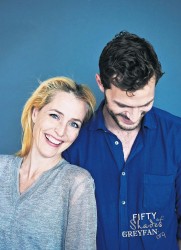
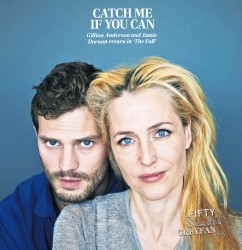
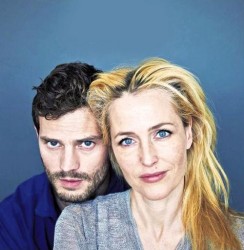
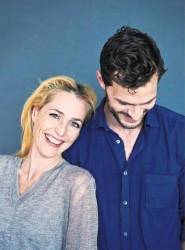
No comments:
Post a Comment